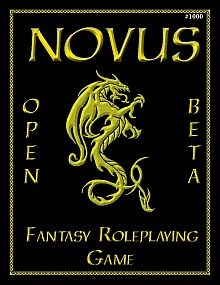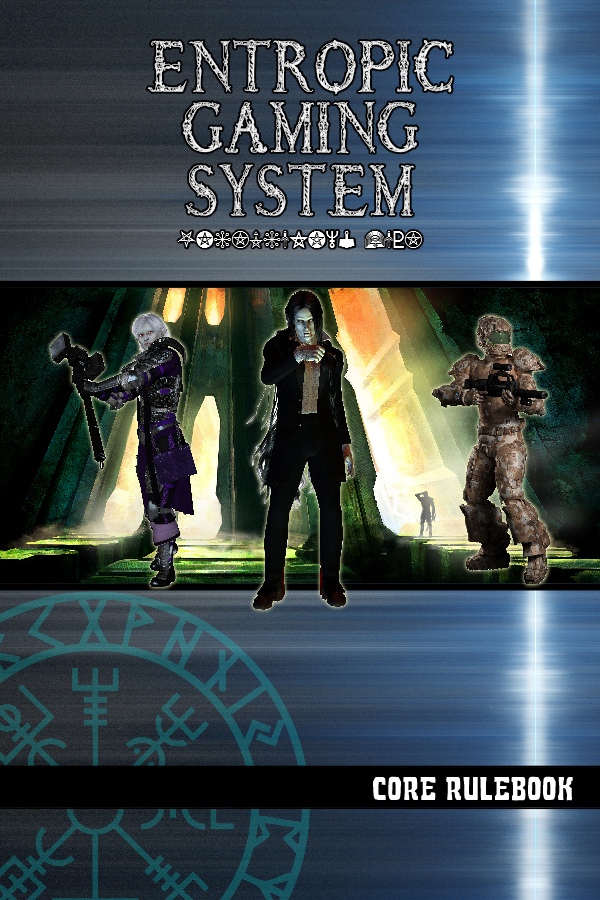Novus
Novus is a complete role-playing game and system published by Firehawk Games.
By Tim Dugger

Welcome to the thirty-first Designer’s Diary, a regular column where designers are given the opportunity to take readers on an in-depth ride through the design and development process of their system, setting, or product. If you’d like to share your product in the Designer’s Diary column, send a message to aaron@roleplayerschronicle.com.
Designer’s Description
The simple answer is that Novus is a 2d10 ≥ TN Skill Based system. That means that you roll 2d10, and then add in any modifiers and try to meet or beat the Target Number. This is how skills work, Saving Throws work, Combat works, and how spellcasting works. Basically, this is how everything works.
Now that may sound a little boring on the surface, but there are lots of little flourishes and tidbits to keep things interesting. For example, I mentioned specifically that Novus is “Skill Based” even though it has Levels and Classes. The Levels and Classes in Novus are there more as shortcuts or frameworks upon which to hang the skill based development upon.
In addition, Novus includes exploding and imploding dice. With Exploding Dice, if you roll a 10 on either die, you roll that die again, and can continue for as long as you roll 10s. With Imploding Dice, if you roll 1 on either die, you roll again and subtract that next roll from your total, and if it is also a 1, you keep on imploding. Now, you will likely realize that the range on the low end is going to be a lot less than the potential range on the high end. And this is true, and it was done on purpose. While the occasional fumble or failure is fun, having one that could potentially kill your character isn’t. Oh, if you roll a 1 on one die and a 10 on the other, then it neither explodes or implodes. Instead you gain a Fate Point and resolve the roll as if you had rolled 11 using any other 2 numbers to reach that total.
Now, the mention of Exploding and Imploding Dice also brings up Snag and Boon Points. With these types of rolls you can be well above or below the Target Number of a given roll. When you do so, you, the player, earns either Snag Points or Boon Points. You then immediately spend these points on Snags or on Boons respectively. You, the player, control the results, not some random roll as some other systems require. For example, earning Boon Points in Combat can result in extra damage to the foe, extra attacks (for free), bonuses to initiative next round, or one of many other possibilities, including the potential instant death of your foe, regardless of how much more powerful he might be. Skills and Spellcasting also have their own lists of Boons.
I also mentioned Fate Points. These are additional ways in which the player can help influence the narrative of the game. Between the Snag/Boon system and the Fate Points, players will be strongly engaged in the game.
As of the time of my writing this, Novus is still in Open Beta, with version 0.6 being the version currently available from RPGNow. However, version 0.7 (which I am hoping is the last version before the end of the Open Beta), is only a week or two away. And the two largest changes that it will bring are the addition of Casting Options to spells, and an expansion and codification of Combat Moves and Combat Styles (which basically reworks the Combat Styles from the ground up).
Now, the Novus spell system consists of several levels. The most basic (until the upcoming version 0.7 of the Novus Open beta is released) was the spells; Basic static spells, customizable only through Boon Points. Then above that, we had the Spell Bases (available in Libram Novus #1). These are what the individual spells are built from, and there are two ways to use them. The first is to use them to customize spells on the fly, and the second was to actually build new spells on the fly. In version 0.7, we add Casting Options, which allows for some customization at the time of casting, but that customization is slightly more expensive than customizing a spell using the Spell Bases.
The Combat Moves and Combat Styles will start off basic, but later additions will allow for increasing complexity and cool moves to keep things interesting for non spell users.
Just wanted to add a note about how the Open Beta is being handled. As we release each version, we have made sure to update the file for every person who has purchased it from RPGNow. This means that they need only return to their RPGNow account to download the latest version of the rules. This will also be the case when we release version 0.7 of the Open Beta and when we release the final version.
Purpose
There are many reasons, some of which would not be polite for me to go into. Suffice it to say that producing Novus and succeeding with it is basically the best revenge that I could have on certain individuals.
Now in actually designing Novus, I wanted a game that was relatively simple, yet extremely flexible and easy for GMs to tinker with. I also wanted it to be fairly balanced and easy to pick up and use. And it had to be fun!
As far as I am concerned, I have succeeded in all of my original goals and reasons for developing Novus in the first place.
Influences
If an author, any author, ever tries to tell you that he has not been influenced by any game that he has worked on or played extensively, then he is lying. Either to you or himself. This holds true for me as well.
In the past, I worked on Rolemaster, and while I specifically tried to minimize its influence on Novus, it is still there, though not as great as it could have been. In fact, I went so far as to be able to find other sources of inspiration for bits I wanted to include. If there is a bit in Novus that you think resembles RM, you can be sure that there is at least one other game, possibly more, that has similar bits.
A partial list of games that did influence Novus to any degree, great or small, includes:
- D20/Pathfinder
- Arcanum (by Bard Games)
- Champions
- Dragon Age
- Talislanta
- Harn
- The d6 System (WEG/Star Wars and the more recent versions both)
- Unisystem
- Synnibarr (believe it or not — it did provide inspiration here and there…)
- And many many more….
Research
Research? Heh! I looked at and read through literally tons of games looking for inspiration. How do they do xx in this system? How do they handle it over in that system? As I mentioned before, I had reasons to try and reduce any RM influences and/or find other sources of inspiration.
Every game out there is built upon the backs of the original rules created by Gygax and Arneson. Without them, there would not have been the literal tons of games on the market today.
Art Direction
Finding the right art is an ongoing process. I try to find pieces that relate to the content on the page where it is or on its facing page. As of right now, I am still on the hunt for artwork — it is always an ongoing process…
Gaming Experience
One of the the main design purposes behind Novus was its flexibility, and that includes the flexibility to play many different types and styles of games. You want a political game? Fine! A dungeon crawl? Have at it! Just about anything you want. Others have told me that I tend to write games that use modern rules to give you an old school feel. So, perhaps that should be included as well.
But truthfully, the actual gaming experience is going to be based upon the style of the game as well as the personalities of the individuals involved.
I have tried to to allow for the widest range of possibilities, and for the most part, I think that I have succeeded, but then again, Novus is not perfect (no game is or possibly could be), but it is the best that I could make it, for the style of game that I like to play, and for as many other styles as I could make it.
Comparison
Keeping in mind that Novus is a relatively new system, and that it doesn’t have a lot to it just yet, I think that Novus compares favorably. It allows players to make characters that they want. First level characters are actually competent, though not overly so, so there are few worries about them surviving a “squirrel” attack, as can happen in some other systems.
And the Snag and Boon Point system also allows the GM to control the level of lethality without fudging dice rolls. An unexpectedly high roll doesn’t have to mean instant death for the character, the GM could choose other Boons such as increasing damage in some ways AND increasing his initiative in the following round and perhaps giving a small boost to his allies. Unintentionally killing the PCs because of a high roll at the wrong time isn’t a worry for Novus.
Additionally, while Novus does give some narrative control to the players, the amount given was carefully considered to ensure that the player can have some effect on the setting while still allowing the GM to retain his control over the important things.
Development Process
I am not sure I could adequately describe my design and development process. In short, however, I have never had problems scrapping bits that didn’t work properly.
For example, the Combat system, weapons do 2 types of damage, Base and Scaled. The base is the minimum that any successful attack does, and the scaled is based on how well the player rolls. So, when making an attack with a broadsword, and if the player rolls a total that is 7 points above the DEF of his target, he will do 15 points of damage. The Broadsword does a Base of 8 damage, and by rolling 7 over foe’s DEF, he does an additional 7 points for a total of 15 points of damage. Of course, now the foe gets to subtract his Armor Rating from this before he marks off hit points.
That is the current damage system. The first draft started with different dice for each attack, based on weapon size. Then I went to using just d10s for damage, and then to a table that did damage based on size of the attack compared to the armor worn. Then one of my playtesters suggested a static amount of base damage with additional damage based on how well he rolled over foe’s DEF. Basically what we currently have. But even then, we went through a couple of iterations.
And this was all before Novus was released in the 0.1 version of the Open Beta last January. Since then, the system has continued to evolve, and I have always been sure to listen to feedback from playtesters and others who have tried the game. Sometimes, I cannot do everything they request, due to plans for future expansions, but I try to accommodate my customers as much as possible.



